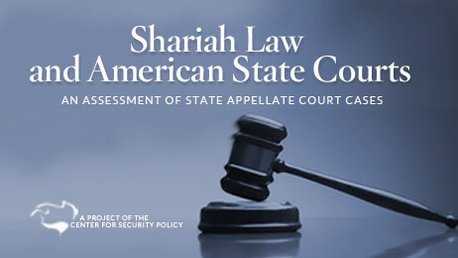Shariah Law and American State Courts: An Assessment of State Appellate Court Cases
This study evaluates published appellate legal cases that involved “conflict of law” issues between Shariah (Islamic law) and American state law.

Top 20 Cases
1. S.D. v. M.J.R., 2 A.3d 412 (N.J. Super. Ct. App. Div. 2010).
Shariah: Highly Relevant TCSY; ACSN
S.D. (wife) and M.J.R. (husband) were both Muslims and citizens of Morocco and both resided in New Jersey. After only three months of marriage, husband began physically abusing wife. The physical abuse administered by husband injured wife’s entire body including her breasts and pubic area. Additionally, husband forced himself on wife and had non-consensual sex with her on multiple occasions. Husband stated to wife that Islam allowed him to have sex with her at any time he wished.
Wife asked the trial court to grant a restraining order against husband shortly after he verbally divorced her in front of their imam. The trial court refused to issue a final restraining order against husband finding that, although husband had harassed and assaulted wife, husband believed it was his religious right to have non-consensual sex with his wife and that belief precluded any criminal intent on the part of husband. The New Jersey appellate court reversed the trial court and ordered that the trial court enter a final restraining order against husband. The New Jersey appellate court stated that the trial court erroneously allowed the husband’s religious beliefs to excuse him from New Jersey’s criminal code and that husband knowingly engaged in non-consensual sex with wife.
2. Hosain v. Malik, 671 A. 2d 988 (Md. Ct. Spec. App. 1996).
Shariah: Highly Relevant TCSY; ACSY
Hosain (wife) and Malik (husband) lived in Pakistan as a married couple for approximately eight years before Hosain fled to the United States with the couple’s daughter. Malik filed for custody of their daughter in a Pakistani court. Hosain did not appear before the Pakistani court because she would have been arrested in Pakistan for adultery because she lived with a man after she fled to the United States. The Pakistani court granted custody to Malik. Malik requested that American courts recognize and enforce the Pakistani custody order via a mechanism known as comity. A Maryland trial court granted comity to the Pakistani custody order. On appeal, the Maryland appellate court affirmed the trial court and granted comity to the Pakistani custody order holding that the Pakistani court considered the best interests of the child in granting custody to Malik. However, the minority opinion disagreed that the Pakistani court considered the child’s best interest and instead focused on factors outside of the “best interests of the child” analysis. These other factors included that the child would live in an “un-Islamic” society if it were allowed to remain with Hosain in the United States.
3. In re Marriage of Obaidi, 227 P. 3d 787 (Wash. Ct. App. 2010).
Shariah: Highly Relevant TCSY; ACSN
Qayoum (husband) and Obaidi (wife) signed a pre-marital agreement known as a “mahr” which was written in Farsi. Husband was a U.S. citizen; had little understanding of any culture outside of America; and did not speak, read, or write Farsi. The contents of the mahr required that husband pay wife $20,000 at some future date, but husband was not advised about the mahr’s contents until after he had signed it. A few months after the couple signed the mahr, they were married in an Islamic wedding; and later they were wed in a civil ceremony. Several months after the civil ceremony, wife was kicked out of the couple’s residence and filed for divorce in Washington state court.
The trial court found the mahr enforceable and awarded wife $20,000 per the terms of the mahr. The trial court noted that husband initiated the divorce without good cause; and therefore, was liable, per Islamic law, to pay the amount due under the mahr. The Washington appellate court held that the trial court erred by looking to Islamic law; and instead should have applied neutral principles of law to determine whether the mahr was enforceable. The appellate court stated that under neutral principles of law (Washington contract law) the parties must agree on the essential terms of a contract in order for the contract to be enforceable. Applying this neutral principle of law, the appellate court held the mahr was unenforceable because the parties never agreed why or when the $20,000 would be due.
- Military Starship: How SpaceX Is About to Make America Globally Dominant - March 4, 2025
- The Cautionary Tale of Zheng He - December 4, 2024
- Frank Gaffney departs CSP after 36 years - September 27, 2024
